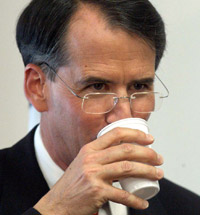Recently, the U.S. ambassador to Armenia, Mr. John Evans, who will soon be removed from office, gave an interview to “Azatutyun” radio station, where he said that U.S.-Armenian relations have strengthened during his two-year term in Yerevan and will develop further in the years to come. He said that Armenia is slowly but surely becoming a democratic state that shares “fundamental values” with the United States.
“I do believe that Armenian-American relations are improving,” said the Ambassador in his interview, “We are cooperating more these days; we have especially been cooperating in the defense and security sectors. There is more American investments here every day, although it’s going at a slow pace. Armenia and the United States share some fundamental values, which help us understand each other better. This is one of the reasons why I believe that Armenia’s future is with the democratic countries of the world. I think Armenia has all the basic preconditions to become a leading democratic country in this region of the world.”
The diplomat praised the double-digit economic growth reported by the Armenian government in recent years, but cautioned that it “has not been even” and has mostly benefited Yerevan. “Yerevan is booming,” he said. “There are traffic jams, the sound of construction never dies. But if the entire country must develop, more attention needs to be given to smaller cities and towns.”
The U.S. administration helped increase development when it approved $235.6 million for additional economic assistance to Armenia under its Millennium Challenge Account program earlier this year. The bulk of the sum is to be spent on upgrading rural roads and irrigation networks. U.S. and Armenian officials say rural poverty in Armenia will decrease considerably as a result.
Speaking about serious challenges facing Armenia, Evans singled out the need to ensure its long-term energy security. “I think that’s very important for a country like Armenia that does not have its own energy sources in the form of hydrocarbons and whose nuclear plant is aging and needs to be closed down in the next decade,” he said.
As for the Karabakh conflict, Mr. Evans said that the fair and long-term settlement of the conflict would support positively the environment of investment in Southern Caucasus. The Ambassador said that he does believe that the co-chairmen do their best to support the conflict settlement and that the parties should negotiate and Baku and Yerevan should find a solution that may be accepted by both of them.
Evans went on to argue that Armenia is still a young state and needs more time to “mature” as a democracy. “There is nothing which says that the road towards greater democracy is going to be always straight, that there won’t be obstacles, that there won’t be occasional steps back,” he said. “But in the long run, that is where Armenia should be headed, and I think that’s where Armenia is headed.”
Evans noted that one of the key obstacles for fair elections in Armenia is the “fear to take decisive steps in instilling the voters with trust to make the right choices about those who represent them.” “It’s a psychological barrier,” he said in an apparent reference to the country’s rulers. “But I think eventually this barrier will be crossed … The time has come to end massive falsifications while confirming the results. We have seen what has happened in other countries where people have played tricks when elections come back. Everyone is responsible for conducting democratic and fair elections; the government, electoral officials, party leaders, judges and mass media representatives. All voters should understand that and should not sell their votes; this is a general responsibility. International organizations will play their role here as well, but this is the responsibility of Armenia in general. I do believe that all democratic countries of the world hope that the upcoming elections in Armenia will be organized based on the standards that Armenia has agreed to be responsible for when joining the OSCE and EU”.

